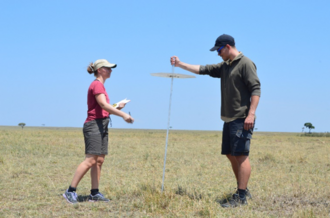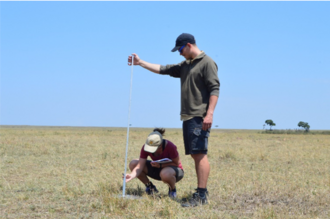2019: Cattles effect on grass biomass on the East African Savanna


Msc. Student: Lea Bach Sloth
Program: Msc., Department of Bioscience
Supervisor: Professor Jens-Christian Svenning and Lecturer Robert Buitenwerf, Department of Bioscience, Ecoinformatic and Biodiversity, Aarhus University
Period: September - December 2019
The Maasai Mara is one of the last ecosystems to support large populations of megafauna herbivores. Many of these wild herbivore populations are dependent on the grass vegetation as a source of food and thus vulnerable to rapid changes in grass biomass. Mara North Conservancy does not only support wild herbivores but also a large number of domestic cattle, sheep and goats. The cattle are an important part of the Maasai culture and over the last couple of decades the number of cattle in Mara North Conservancy has increased. The greater number of cattle may increase food competition among grazing herbivores in Mara North Conservancy. Thus, a further understanding of the effect that cattle have on grass biomass is important to ensure a sustainable coexistence between cattle and wild herbivores.
The aim of this study is to estimate and predict cattle effects on grass biomass in the Maasai Mara. In Mara North Conservancy, a cattle grazing scheme has been set up as part of the conservancy management plan. The conservancy is divided into different blocks, where the cattle are allowed to graze in different time periods throughout the year. This has been done to secure a sustainable use of the grasslands, to avoid overgrazing in certain areas of the conservancy and to ensure the continuing conservancy status for Mara North.
Data collection will take place from September 18th to December 15th 2019 in Mara North Conservancy. To estimate the grass biomass, I will use a disc pasture meter (see above pictures), to collect measurements in grazing blocks with a gradient in the time since cattle grazing. The measurements will be compared to Sentinel 1 satellite imagery, to create a tool that can predict cattle effect on grass biomass, which may be used in developing future management plans and sustainable grazing scheme planning.